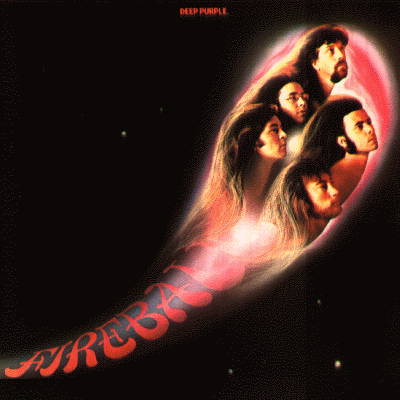 |
From the Vault...
05/21/2006
#995 |

|
info
Deep Purple
"Fireball"
© Warner Bros. Records
Year of Release: 1971
Rating:



|
track listing
Fireball
No No No
Strange Kind
Of Woman
Anyone's Daughter
The Mule
Fools
No One Came
|
WSVNRadio Archives
Deep Purple related sites:
|
|
|
Deep Purple
"Fireball"
Deep Purple ... One of the greatest hard rock bands to surface from the
1970s ... The year was 1971, and the lineup of Ritchie Blackmore's band was
considered its peak. Roger Glover was lead vocalist, and despite hardly any
of the songs didn't ring any memory bells for me, it was considered one of
their finest shining moments, and to critics and fans, one of their best
albums.
The title track definitely has a great hard rock sound, and being a fellow
keyboardist myself, I've always been impressed with Jon Lord's keyboard playing,
as it shows once again on this song. "No No No" is another good song,
and it showcases how Blackmore was (and still is) one of Rock's finest guitarists.
Even the bass playing of Ian Gillian shines on this song, as Blackmore provides
the extensive guitar solo/leads. And yes, even Jon Lord has a very cool
keyboard solo/lead towards the end of the song.
Was "Strange Kind Of Woman" a major hit? It seems this song did
bring some memory bells, maybe it was because a friend from high school may
have played it for me from the band's "best of" compilation (Deepest Purple:
The Very Best Of Deep Purple. This song is probably my most favorite from
this album.
In reading the liner notes from this album, it was mentioned that
"Anyone's Daughter" was a hit, but this song is quite different than
the hard rock of Deep Purple -- It has a somewhat country feel, and the vocals
seem to resemble Bob Dylan's in a way. Jon Lord is featured on piano,
rather than the traditional organ playing. Fans of Deep Purple will NOT guess
this song as by Deep Purple, but it is interesting to listen to, as Deep Purple
takes a different approach in their traditional standard hard rock style.
Ok, back to our original scheduled programming... "The Mule" returns
with the hard rock style, Blackmore's guitar work shines on this one. This song
almost has a Progressive Rock flavor too. Roger Glover's voice is easily
recognized as Deep Purple on the next song, "Fools," a song definitely
fitting the traditional Deep Purple sound. And towards he end, the band plays
music as they have before, where their music has a Progressive Rock style, yet
it could also be classified as Classical.
(See the
self-titled review.)
"No One Came" also has the traditional hard rock Deep Purple style,
ending the album, as it has a blues edge, as heard from the harder rock songs
of Thin Lizzy.
Growing up in the 1970s, Deep Purple wasn't really followed with their
albums with me, as Led Zeppelin, Black Sabbath and Eric Clapton. My interest
peaked when Whitesnake was popular with David Coverdale, as he replaced Roger
Glover as lead vocalist in 1973.
Deep Purple for me was remembered mostly for "Smoke On The Water."
However, Ritchie Blackmore could be considered as part of the Big 3 of 1970s
Guitarists -- with the likes of Clapton and Jimmy Page. His works should
not be overlooked. Blackmore would form the band Rainbow after leaving Deep
Purple, and return to Deep Purple with a few reunions. His latest project/band
is Blackmore's Night,
which just released a new album (The Village Lanterne, 2006). Their
website classifys them as Renaissance style rock, where Blackmore has an interest
in Classical Music. Blackmore's post-Deep Purple and post-Rainbow projects have
always interested me. It seems his works with his Night band are hard to find,
but I'm sure they're out there somewhere, either on Amazon.com or most likely,
ebay. (Looking at Amazon.com, Blackmore's Night CDs are mostly high-priced
imports.) But Blackmore will always be remembered for Deep Purple, and
Fireball is a very good album, for those who enjoy the Classic Rock and
Hard Rock of the 1970s.
© WSVNRadio.net. All rights reserved.
Review or any portion may not be reproduced
without written permission. Cover art is the
intellectual property of
Warner Bros. Records
and is used for reference purposes only.
|
|





